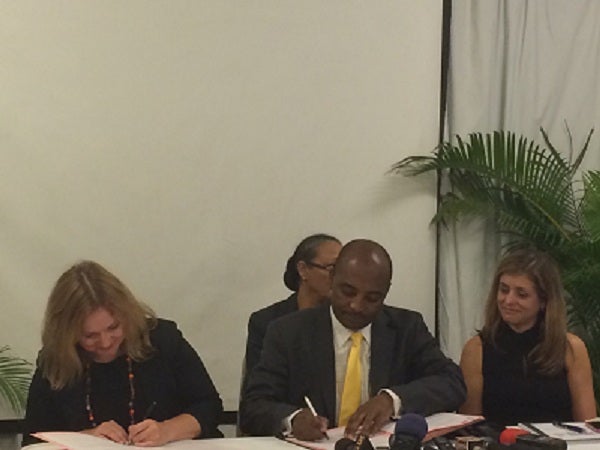* By Anouk Ewald
One, a woman from the Northern colds of developed Europe. The other, a man from the warmth of the sunny but developing Caribbean. What can they possibly have in common? What are they talking about? That’s what we wondered while seeing the two of them sitting together, engaged in an animated discussion as if they were old friends, but surprisingly they had only met just a few minutes ago.
For the last three years we have heard many Haitian Ministers of Education talk about shifting toward a quality agenda. After many years of working to increase access to education, it seemed they all agreed that it is now time to improve quality. Few, however, have been able to take actions to address the problem. Until, finally, a few weeks ago, the Ministry of Haiti announced the establishment of 12 measures to reform the education sector and improve quality, through teacher permits and training, school certification, and new student evaluation measures.
Then in July 2014, with support from the IDB, the Government of Haiti initiated a dialogue with the Finnish Ministry of Education and Communications in a quest to learn from other countries. It took an hour of introductions, 2 hours of formalities, and 3 days of presentations to finally hear about the Finish education system, a system so fascinating that it seems unreal.
So, who are they? What exactly are they talking about? They are the Minister of Education and Communications of Finland, Krista Kiuru, and the Minister of Education of Haiti, Nesmy Manigat, and they are conspiring to improve education in Haiti. They are plotting to give all Haitian children a better tomorrow, to offer the Caribbean nation a higher chance at becoming a developed country, and to create a better society through improved-quality education.
Minister Kiuru traveled to Haiti in September 2014, where she signed with Minister Manigat a Memorandum of Understanding (MOU) to strengthen the bilateral relations between the two countries in order to cooperate in areas of strategic interest, such as curriculum development, teacher training, and evaluation and assessment.
This shift toward quality augurs well for the Haitian education sector, where 1 out of 4 sixth grade students and 3 out of 4 in twelfth grade failed the 2014 national exams. These results show that education quality is clearly the main challenge. According to the 2013/14 school census, 46,060 of the 82,094 teachers surveyed, in both the public and non-public sector, have no professional teaching qualifications. From the 17,120 schools in Haiti, 85% are non-public, and of that percentage, only about 30% (4,358) have some type of operating permit by the MENFP.
So, what do they have in common? They share a vision: “to provide all citizens with equal opportunities.”
The next steps are for a Haitian Delegation to visit Finland. The actions taken by the MENFP in the last few months show the will that may eventually pave the way for the shift toward quality. How far will it lead? Only time will tell.
For now, to Finland we go!
* Anouk Ewald is an Education Specialist working in the IDB’s field office in Haiti.



Leave a Reply